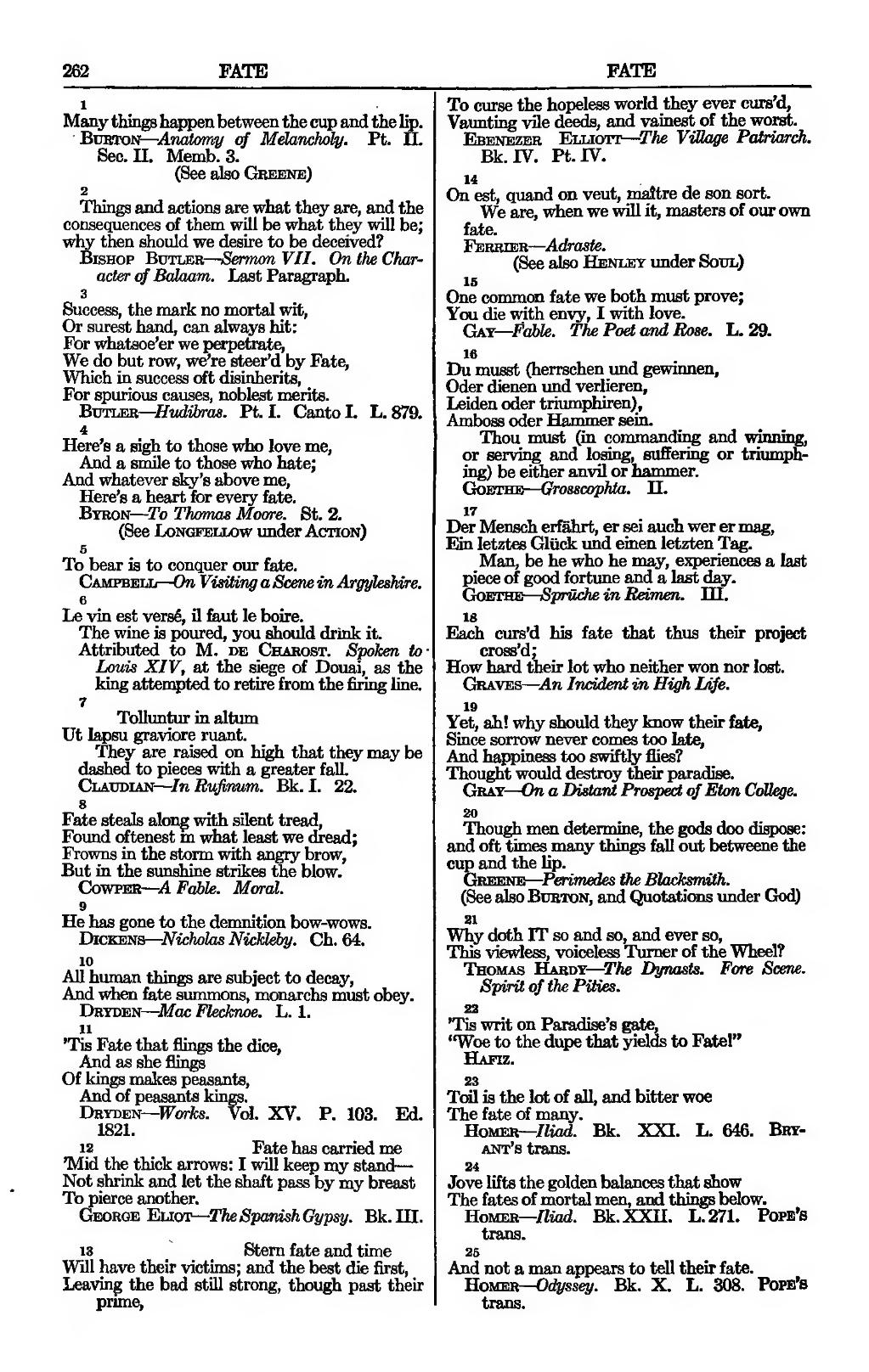262 FATE
Many things happen between the cup and the lip.
| author = Burton
| work = Anatomy of Melancholy.
| place = Pt. II. Sec. II. Memb. 3.
| seealso = (See also {{sc|Greene)
2
Things and actions are what they are, and the
consequences of them will be what they will be;
why then should we desire to be deceived?
Bishop Butler—Sermon VII. On the Character of Balaam. Last Paragraph.
Success, the mark no mortal wit,
Or surest hand, can always hit:
For whatsoe'er we perpetrate,
We do but row, we're steer'd by Fate,
Which in success oft disinherits,
For spurious causes, noblest merits.
Butler—Hudibras. Pt. I. Canto I. L. 879.
Here's a sigh to those who love me,
And a smile to those who hate;
And whatever sky's above me,
Here's a heart for every fate.
| author = Byron
| work = To Thomas Moore. St. 2.
(See Longfellow}} under Action).
| place =
| note =
| topic =
| page =
}}
{{Hoyt quote
| num = 5
| text = To bear is to conquer our fate.
Campbell—On Visiting a Scene in Argyleshire.
Le vin est vers6, il faut le boire.
The wine is poured, you should drink it.
Attributed to M. de Charost. Spoken to
Louis XIV, at the siege of Douai, as the
king attempted to retire from the firing line.
Tolluntur in altum
Ut lapsu graviore ruant.
They are raised on high that they may be
dashed to pieces with a greater fall.
Claudian—In Rufinum. Bk. I. 22.
Fate steals along with silent tread,
Found oftenest m what least we dread;
Frowns in the storm with angry brow,
But in the sunshine strikes the blow.
Cowpek—A Fable. Moral.
He has gone to the demnition bow-wows.
All human things are subject to decay,
And when fate summons, monarchs must obey.
Dryden—Mac Flecknae. L. 1.
| author =
| work =
| place =
| note =
| topic =
| page = 262
}}
{{Hoyt quote
| num =
| text = <poem>Tis Fate that flings the dice,
And as she flings
Of kings makes peasants,
And of peasants kings.
Dryden—Works. Vol. XV. P. 103. Ed.
1821.
| author =
| work =
| place =
| note =
| topic =
| page = 262
}}
{{Hoyt quote
| num =
| text = <poem>Fate has carried me
'Mid the thick arrows: I will keep my stand—
Not shrink and let the shaft pass by my breast
To pierce another.
George Eliot—The Spanish Gypsy. Bk. III.
| author =
| work =
| place =
| note =
| topic =
| page = 262
}}
{{Hoyt quote
| num =
| text = <poem>Stern fate and time
Will have their victims; and the best die first,
Leaving the bad still strong, though past their
prune,
To curse the hopeless world they ever curs'd,
Vaunting vile deeds, and vainest of the worst.
Ebenezer Elliott—The Village Patriarch.
Bk. IV. Pt.IV.
On est, quand on veut, mattre de son sort.
We are, when we will it, masters of our own
fate.
Ferrter—Adraste.
| seealso = (See also Henley under Soul)
| topic =
| page =
}}
{{Hoyt quote
| num =
| text = <poem>One common fate we both must prove;
You die with envy, I with love.
Gay—Fable. The Poet and Rose. L. 29.
Du musst (herrschen und gewinnen,
Oder dienen und verlieren,
Leiden oder triumphiren),
Amboss oder Hammer sein.
Thou must (in commanding and winning,
or serving and losing, suffering or triumphing) be either anvil or hammer.
Goethe—Grosscophta. II.
Der Mensch erfahrt, er sei auch wer er mag,
Ein letztes Gluck und einen letzten Tag.
Man, be he who he may, experiences a last
piece of good fortune and a last day.
Goethe—Spruche in Reimen. III.
Each curs'd his fate that thus their project
cross'd;
How hard their lot who neither won nor lost.
Graves—An Incident in High Life.
Yet, ah! why should they know their fate,
Since sorrow never comes too late,
And happiness too swiftly flies?
Thought would destroy their paradise.
Gray—On a Distant Prospect of Eton College.
Though men determine, the gods doo dispose:
and oft times many things fall out betweene the
cup and the lip.
Greene—Perimedes the Blacksmith.
| seealso = (See also Burton, and Quotations under God)
| topic =
| page =
}}
{{Hoyt quote
| num =
| text = <poem>Why doth IT so and so, and ever so,
This viewless, voiceless Turner of the Wheel?
Thomas Hardy—The Dynasts. Fore Scene.
Spirit of the Pities.
’Tis writ on Paradise's gate,
"Woe to the dupe that yields to Fate!"
Hafiz.
Toil is the lot of all, and bitter woe
The fate of many.
Homer—Iliad. Bk. XXI. L. 646.
| note = Bryant's trans.
Jove lifts the golden balances that show
The fates of mortal men, and things below.
Homer—Iliad. Bk. XXII. L. 271
| note = Pope's trans.
And not a man appears to tell their fate.
Homer—Odyssey. Bk. X. L. 308
| note = Pope's trans.
